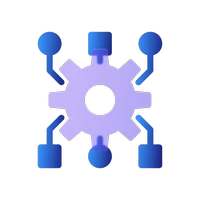
Risk Management
?Risk Management
The RMA™ is a blockchain credibility certification assessing governance, transparency, security, and results, providing trusted verification for businesses in Web3.
VaaSBlock has not audited this project and cannot vouch for this organization.
RMA™ Status: ❌ Unverified
Verification of 6 major compliance criteria.
Technology
?Technology
A collection of public facing information, data collected through partners and our own tools view we present a projects technology in one place for easy verification.
Analysis and testing of tech infrastructures.
Marketing
Alpha?Marketing
Top level look at a projects marketing capablities currently in alpha this section will grow to show quickly how a project promotes itself and the effectiveness.
Screening of user base and community feedback.
Background
?Background
Using multiple public facing sources across the web view a summary of a projects purpose, key achievements and general overview.
Collection of basic administrative documentation.
Risk Management
Last Updated
2025/4/16
Transparency
Transparency Score
Algorithmic assessment of a project’s transparency level, using multiple public data points to measure its commitment to compliance, documentation, and clarity in communication.
Transparency Score
Category Rank
A ranking that positions the organization among its industry peers, evaluating its relative performance based on key compliance, credibility, and transparency indicators.
Category Rank
Pocket vs Data & Analytics
VaaSBlock Rank
A global ranking that compares the organization against all entities listed on VaaSBlock, reflecting its overall credibility, transparency, and operational performance versus the full Web3 ecosystem.
VaaSBlock Rank
Pocket vs All Listed Organizations
Transparency
Transparency Score
Transparency Score
Algorithmic assessment of a project’s transparency level, using multiple public data points to measure its commitment to compliance, documentation, and clarity in communication.
Category Rank
Pocket vs Data & Analytics
Category Rank
A ranking that positions the organization among its industry peers, evaluating its relative performance based on key compliance, credibility, and transparency indicators.
VaaSBlock Rank
Pocket vs All Listed Organizations
VaaSBlock Rank
A global ranking that compares the organization against all entities listed on VaaSBlock, reflecting its overall credibility, transparency, and operational performance versus the full Web3 ecosystem.
RMA™
✘ UnverifiedCorporate Governance
The verification of fundamental governance, organizational structure, including verifying the entity’s legal registration and adherence to local laws and regulations.
Corporate
Governance

Team Proficency
Evaluation of an organization’s personnel, ensuring that crucial team members possess the expertise and dedication necessary to execute current business models and scale effectively.
Team
Proficiency

Technology & Security
Assessment of the organization’s technological framework, including blockchain integrations (where relevant), system architecture, and overall IT infrastructure.
Technology
& Security

Revenue Model
Comprehensively evaluation of a company’s income-generating strategies (how do they make or intend to make money), ensuring financial robustness and sustainability.
Revenue
Model

Results Delivered
The Results Delivered component of the RMA™ audit comprehensively evaluates an organization’s ability to achieve its goals and honor its commitments.
Results
Delivered

Planning & Transparency
The Planning and Transparency component of the RMA™ audit offers a thorough assessment of how an organization manages its workflow and prepares for unexpected challenges.
Planning &
Transparency

Technology
Marketing
Marketing Effectiveness
This score assesses the impact of detected marketing activity and the corresponding price movement of a token. The score understands whole market movements to ensure tokens are assessed fairly against peers.
Marketing Effectiveness
Confidence Index
This index determines our confidence in the score we have given. Generally, as more data is collected, the confidence index will increase. If a project has lots of activity, this confidence is earned faster.
Confidence Index
VaaSBlock Rank
This identifies where a project sits compared to all projects accessed for Marketing Effectiveness.
VaaSBlock Rank
Pocket vs All Listed Organizations
Marketing Effectiveness
Marketing Effectiveness
This score assesses the impact of detected marketing activity and the corresponding price movement of a token. The score understands whole market movements to ensure tokens are assessed fairly against peers.
Confidence Index
Confidence Index
This index determines our confidence in the score we have given. Generally, as more data is collected, the confidence index will increase. If a project has lots of activity, this confidence is earned faster.
VaaSBlock Rank
Pocket vs All Listed Organizations
VaaSBlock Rank
This identifies where a project sits compared to all projects accessed for Marketing Effectiveness.
No Chain No Gain™ Podcast ⛉
This Organization is yet to join the No Chain No Gain™ Podcast and share insights on what makes their business trustable and innovative.
💡 NCNG generated over 1 Million impressions in its first six months of existence.
PR Impact
PR Impact
VaaSBlock provides estimations to the impact that traditional digital media can have on a project. This is an early release; more areas of PR are planned in future versions.
Search Terms ? Search TermsThese are the terms we discovered the article for on page one of Google. | Est. Traffic ? Estimated TrafficWe estimate how much traffic an article will get. Generally, our estimations are slightly higher than those of more established tools. We are working on the algorithm all the time, and results could change. | Est. Value ? Estimated ValueBased on the estimated traffic we generate an estimation for what this traffic would have cost to generate if you tried to target these users with ads. The positions for the article on google and the location of the traffic are the major factors in this estimation. | |||
|---|---|---|---|---|---|
Pocket And Firefox source: Getpocket | Pocket And Firefox… — Pocket And Firefox source: Getpocket | getpocket.com | |||
Pocket has shut down – What you need to know | Pocket Help source: support.mozilla.org | Pocket has shut down… — Pocket has shut down – What you need to know | Pocket Help source: support.mozilla.org | Organic | support.mozilla.org | ||
Pocket Help source: support.mozilla.org | Pocket Help… — Pocket Help source: support.mozilla.org | Organic | support.mozilla.org | ||
What is Pocket Network? source: thebigwhale.io | What is Pocket Netwo… — What is Pocket Network? source: thebigwhale.io | Organic | thebigwhale.io |
| Est. Traffic | Est. Value | ||
|---|---|---|---|
Pocket And Firefox… — | |||
Pocket has shut down… — | |||
Pocket Help… — | |||
What is Pocket Netwo… — |
Ratings
AlphaOverall
Aggregated Rating
The combined score with AI-driven weighted analysis to provide the best possible project rating.
35800 verifications
Confidence Index
This index determines our confidence in the score we have given. Generally, as more data is collected, the confidence index will increase. If a project has lots of activity, this confidence is earned faster.
Low
35800 verifications
External Reviews
Third-party reviews are important for your reputation.We incorporate them into our Deep Due Diligence framework to provide a more comprehensive and transparent evaluation of each project. Collaborating with VaaSBlock ensures your reviews are not only acknowledged but actively contribute to building trust, improving your credibility, and maximizing the impact of your public reputation. Work with us now.
Background
Organization Name – Pocket
Category –  Data & Analytics
Data & Analytics
About
powered by irmaAI
irmaAIPocket Network is a decentralized infrastructure protocol designed to provide reliable, performant, and cost-effective access to blockchain data. Founded in 2017 by Michael P. O’Rourke, Luis Correa …de Leon, Luis Ramon Correa de Leon, and Pabel de Jesus Nunez Landestoy, the project aims to decentralize the Remote Procedure Call (RPC) layer, which is essential for decentralized applications (dApps) to interact with blockchain networks.
The network operates by incentivizing a global network of independent node operators to provide RPC services. These nodes relay data requests and responses between dApps and various blockchains, ensuring high availability and redundancy. By decentralizing this layer, Pocket Network eliminates single points of failure and reduces reliance on centralized infrastructure providers.
Pocket Network’s native token, POKT, is used to coordinate the network’s operations. Developers stake POKT to access the network’s services, while node operators earn POKT by servicing data relays. This tokenomics model aligns incentives between developers and node operators, fostering a sustainable and scalable ecosystem.
Since its mainnet launch on July 28, 2020, Pocket Network has experienced significant growth. The network has expanded to support over 50 blockchains, including Ethereum, Polygon, and Binance Smart Chain, providing developers with a unified interface to access multiple networks. This multichain support simplifies the development process for dApps that require interaction with multiple blockchains.
In February 2022, Pocket Network achieved a milestone by surpassing 30,000 active nodes, making it one of the largest decentralized infrastructure networks. This extensive node network enhances the network’s resilience and ensures low-latency access to blockchain data for developers worldwide.
The network’s governance is managed by the Pocket Network DAO, which oversees protocol upgrades, parameter changes, and other critical decisions. This decentralized governance model empowers the community to shape the network’s future and ensures that it remains aligned with the interests of its stakeholders.
In June 2025, Pocket Network launched the Shannon upgrade, marking a significant evolution of the protocol. Named after Claude Shannon, the father of information theory, this upgrade transformed Pocket Network into the first permissionless Open API Network. Beyond decentralized RPC, Shannon enables access to AI models, public data, and other services, expanding the network’s utility and opening new avenues for developers.
The Shannon upgrade introduces protocol-level payments, automatic quality scoring, and a new model for permissionless coordination. These features enhance the network’s scalability and reliability, ensuring that developers can access high-quality services without centralized intermediaries.
Pocket Network’s vision is to build a fully decentralized internet infrastructure stack, where no single party controls access to the data that applications rely on. By providing a censorship-resistant and permissionless platform, Pocket Network aims to empower developers and users alike, fostering innovation and resilience in the Web3 ecosystem. Read More
Creation Date
February 2026
Headquarters
Tampa, Florida, United States
Organization Maturity Level
Growing Business
RMA™ Type
–
Notable Achievements
2017
Project founded
2020
Mainnet launched
2022
Surpassed 30,000 active nodes
2025
Shannon upgrade launched
- vaasblock.com /
- Data & Analytics /













